OET was recently accepted in the UK by the General Medical Council, which regulates doctors; and the Nursing and Midwifery Council, which regulates nurses and midwives. Designed specifically for healthcare professionals, OET assesses English language skills using real healthcare scenarios, which means candidates prepare for the test using language that is both familiar and useful for their future career.
Academic Ceri Butler, who worked as a medical educator at University College London for 11 years, is currently a doctoral student focusing on research into the integration of refugee healthcare professionals into host countries.
Butler says: “The longer refugee healthcare professionals are away from their profession, the more challenging it can be for them to return to work, and for many the English test is a significant hurdle.”
OET aims to lessen this hurdle by providing a number of refugee doctors and nurses with the opportunity to sit OET free of charge, as well as giving the candidates materials to assist in their test preparation.
OET also hopes to engage the support of its test venue partners and preparation providers to give ongoing assistance to refugee healthcare professionals in the future.
Sujata Stead, OET’s CEO says the collaboration with RefuAid, which provides refugees with access to language tuition, education and employment opportunities will change lives.
“Moving to another country, learning a new language and working in a different culture is daunting, even in the best of circumstances. OET is committed to helping refugee healthcare professionals overcome the challenge of proving English proficiency so they can work in the profession they’re qualified for and join the UK’s healthcare workforce,” she concluded.
Bob Anderson from Mobile Education Partnerships gives a glimpse into the award-winning work that they have been doing to increase the English levels of teachers in Southeast Asia.
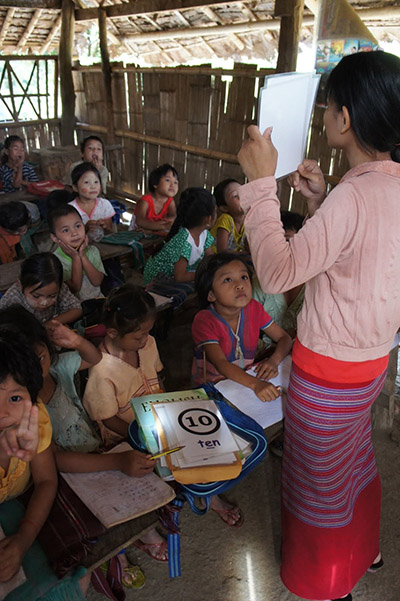
Established in 2002 by British teachers Mobile Education Partnerships (MEP) is a specialist, award-winning educational charity working in communities affected by war, poverty and displacement on the Thai/Myanmar border and within Myanmar itself.
MEP has developed a unique model of teacher training that is both practical and sustainable using mobile units of British and Burmese trainers to reach poorly resourced, remote schools in refugee and migrant communities, where teachers have little or no training.
MEP is not a permanent presence but works for finite periods in partnership with local educational organisations, responding to needs by providing training and qualifications leading to local ownership of sustainable programmes.
Currently MEP works in the Karen refugee camps of the Thai/Myanmar border (pictured left), in war-torn Kachin State, Northern Myanmar where about 100,000 people are displaced by the continued fighting and in Mon State, Southern Myanmar where monastic schools cater for many children from internally displaced families.
In 2010, MEP, with the support of Harrow International School, Bangkok, introduced Cambridge English Qualifications for refugee and migrant teachers at their request. In addition to providing teachers with a highly valued internationally accredited certificate (below), by taking teachers through Cambridge courses, teachers are exposed to a range of teaching approaches and learning styles designed to enhance student outcomes.
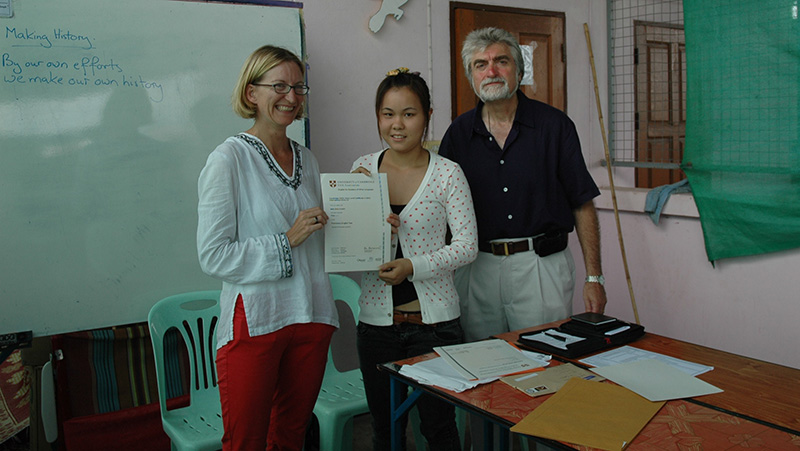
These projects equip and support teachers to practice more effective teaching techniques designed to engage children and which can be applied across a range of subjects. The model we use is transferable and provides sustained in-school support for individual teachers.
To address the issue of sustainability MEP gradually developed the concept of a Cambridge Plus course for local teachers. The Cambridge Plus is a three phase programme which produces cohorts of trained local trainers with internationally accredited Cambridge certificates who can continue to carry out teacher training and the delivery of Cambridge courses independently in the future, with the potential to transform the futures of some of the most disadvantaged young people in Myanmar and Thailand.
MEP has been directly involved in the training of almost 2,000 teachers, produced text books now used by up to 18,000 refugee children and has taken 351 teachers through Cambridge English exams. In the last year alone, 89 trainee teachers took the MEP TESOL course in war-torn Kachin state and 3,000 children in 29 migrant schools benefited from MEP training and support.
MEP received the TEFL.com Charity of the Year Award 2011, and has been endorsed by world-renowned linguist Professor Noam Chomsky as an “excellent and constructive initiative”. Our Founder and Programme Director in the UK, Bob Anderson, was shortlisted for the prestigious Guardian International Development Achievement Award.
In January 2018 for its work with MEP in providing support for Cambridge exams and schools in the refugee and migrant communities of Thailand and in marginalised communities within Myanmar, Harrow International School, Bangkok, was awarded the British International Schools Award for Outstanding Community Initiative.
Cambridge English’s Southeast Asia team and UK head office, as well as Durham University Refugee Action Group have also played a role in supporting this whole programme. As International schools from 38 countries were entered for this award, this programme could be regarded as one of the best partnership programmes in the world.
If you would like to find out more about the work of MEP or how you can get involved then please contact Bob Anderson, Programme Director
Dr. Katherine Weber
Dr. Katherine Weber from FutureLearn highlights the power of online learning for refugees and how connections they make through social learning can help them to improve their lives.
I’m Partnership Manager & Academic Engagement Lead at FutureLearn, the social learning company. Our vision is to create a global community, where everyone learns together and enjoys access to the education they need to transform their lives.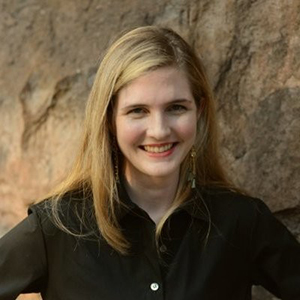
One of the great advantages of online education is its flexibility, and its capacity to open up resources to populations that have been excluded from traditional or face-to-face access.
The majority of our courses are available for free for the course duration, and our new, sponsored course model allows partners to offer learners unlimited free access to a course as well as a free downloadable Certificate of Achievement.
Where refugees are concerned, we’re fortunate to work with partners who are creating innovative, high-quality courses specifically for these populations and the people who work with them, as well as courses that help explain migration to the wider public.
What’s currently available?
Cambridge Assessment English is at the forefront of this group of partners, with the courses Volunteering with Refugees, which is aimed at those who are or would like to volunteer to teach English to refugees, and Aim Higher: Access to Higher Education for Refugees and Asylum Seekers, (pictured filming below) which is aimed at refugees in the UK looking for a path to start or continue their higher education.
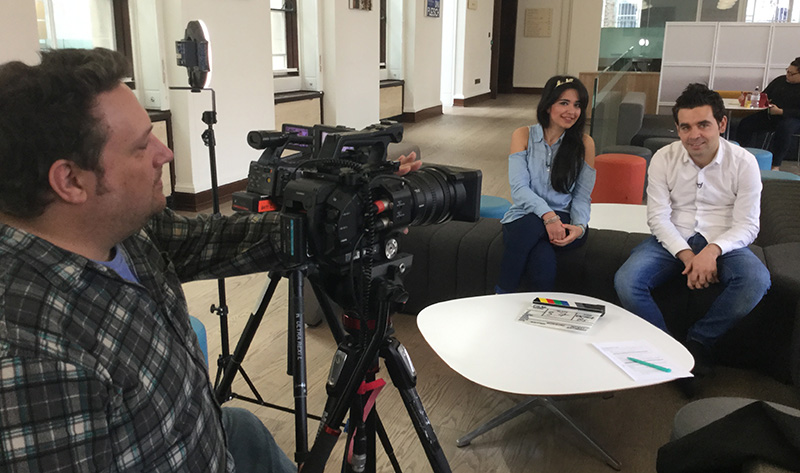
Both the London School of Hygiene & Tropical Medicine and Deakin University offer courses that help learners understand humanitarian health crises and humanitarian aid. Learners who complete Deakin’s course can also join a full degree on Development and Humanitarian Action on FutureLearn.
For learners who are curious about migration generally, the European University Institute offers a pair of courses, Why Do People Migrate? Facts and Why Do People Migrate? Theories, which aim to help dispel common misconceptions and explain the phenomenon of migration in greater depth.
What’s coming up?
King’s College London are producing 12 courses to run on FutureLearn as part of the PADILIEA project (Partnership for Digital Learning and Increased Access), to help those displaced by the Syrian crisis. This project starts with two pre-intermediate English language courses this summer, with further courses around nursing and entrepreneurship in development.
The University of Strathclyde and CELCIS (Centre for Excellence for Looked After Children in Scotland), who developed Getting Care Right for All Children: Implementing the UN Guidelines for the Alternative Care of Children, are working on further learning that pertains specifically to those who work with children on the move. University College London's newly launched RELIEF Centre focuses on 'how to build a prosperous and inclusive future for communities affected by mass displacement', including a specific project for refugees in Lebanon.
And this month, the University of Glasgow is launching a course for those who work directly with refugees, Working Supportively with Refugees: Principles, Skills and Perspectives.
Building supportive communities
FutureLearn’s pedagogy is based on the theory of social learning. This means that discussion is integrated into every step of our courses, and learners are encouraged to help each other along the way and to interact with the course team.
Our hope for all of our courses is that they help learners to develop their knowledge through the structure of the course narrative and the discussion that it provokes. For refugees in particular, we hope the connections they make through social learning can help them improve their lives and open up new opportunities long after the course has ended.
Adrian Matthews
Adrian Matthews, Trustee at Cambridge Refugee Resettlement Campaign, talks about supporting Cambridge refugees with computer literacy skills to give them the skills and confidence to prepare for the future world of work.
For newly arrived refugees, IT skills are vital to education and work prospects, or simply for making the most of what the internet has to offer. This is particularly important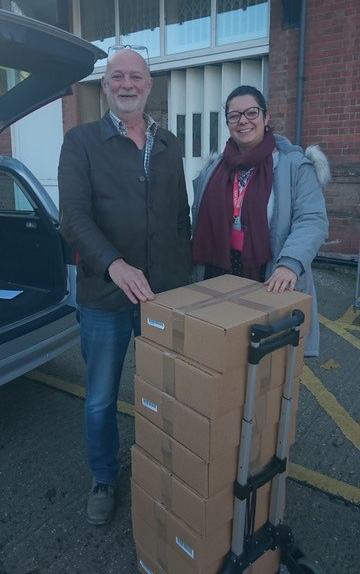 for children in the newly settled families, for whom being able to use a computer is almost a requirement for secondary and college study. But for refugees the cost of buying a computer for the family or for a child at school or college is prohibitive.
for children in the newly settled families, for whom being able to use a computer is almost a requirement for secondary and college study. But for refugees the cost of buying a computer for the family or for a child at school or college is prohibitive.
That’s why Cambridge Refugee Resettlement Campaign (CRRC) conducted an audit of the 18 families resettled by Cambridge City Council to establish which families to prioritise for the allocation of second-hand laptops, which were kindly donated by Cambidge Assessment. (Pictured right with the author)
Before being allocated to the families most in need, the computers were updated by CRRC’s IT team to ensure they have all the appropriate software and features.
The team then set up an initial training session at the Jesus Lane Friends Meeting House on 20 May for those who needed it. A group of around 10 people attended this session, during which the IT team were able to answer any computer related questions and install more software as required.
Since they are mainly Syrian refugees, it is important for them to have access to Arabic software; CRRC volunteers were able to show them how to access an online Arabic keyboard and other useful features such as a free online translation tool.
“It was great to see that all of those who attended the session had such a keen interest to learn about computers. There were people with varying computer skills but I think we managed to ensure that everyone benefited and got what they wanted out of this session.” Marcin, IT volunteer
Another volunteer, Nina, told the group about the possibility of organising a coding club for the children in the families. Learning about computers and programming in a friendly and fun way would build up their confidence and give them skills that will be crucial for the jobs of the future.
If you’d like to be a CRRC volunteer or would like to help in any way, please visit our website.
The School Bus Project
Rowena Gerrett from the School Bus Project discusses how education is a human right that should be accessible to all, and if you can’t get to a school, the school will come to you.
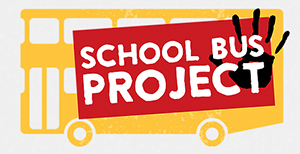 At the School Bus Project, we believe that if you can’t get to school, then school will come to you! Article 26 of the United Nations Convention of Human Rights states that everybody has the right to an education, and this fundamental principle is at the core of what we do.
At the School Bus Project, we believe that if you can’t get to school, then school will come to you! Article 26 of the United Nations Convention of Human Rights states that everybody has the right to an education, and this fundamental principle is at the core of what we do.
As over half of the people currently displaced around the world are under the age of 18, and research shows that just one in two refugees access primary education and one in four access secondary education, the need for educational provision focussed specifically on the needs of displaced people is paramount. In Northern France, we undertake direct delivery of educational sessions six days per week, in a space where very little other educational opportunities are available for the communities we work with.
In addition to direct delivery, our charity works towards a number of goals. We work to support communities that want to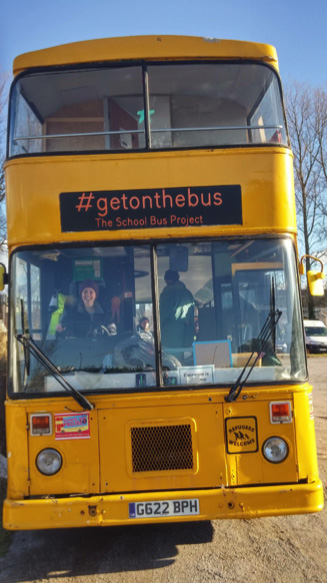 provide education to refugees and migrants in their own area, providing training and logistical support. For example, we are currently supporting the development of a new educational and well-being project ‘Heart on Wheels’ which will be operating in Northern Greece.
provide education to refugees and migrants in their own area, providing training and logistical support. For example, we are currently supporting the development of a new educational and well-being project ‘Heart on Wheels’ which will be operating in Northern Greece.
We work in conjunction with advocacy groups, such as Help Refugees and Safe Passage, seeking to place appropriate pressure on authorities to work to change the situation, most especially in the area of safeguarding for minors – a situation that is currently far from acceptable.
We work thematically in our teaching: our first goal is for the people we work with to feel comfortable, heard and respected. It is only within this context that anyone is able to learn, especially those who are experiencing on-going trauma.
Secondly, we work to develop skills. We aim to help prepare the people we work with for the experiences they will have in the future, hopefully including re-integration into mainstream education of some form. The sharing of language and culture is at the heart of this work.
Through our varied content, we seek to develop language and communication skills, and we make use of English, French and German, in conjunction with the plethora of languages that are spoken by the migrant communities we work with. We have been fortunate to work with some fantastic language teachers, who have brought their expertise and experience to the project, alongside mainstream education teachers, social workers, speech and language therapists and youth workers.
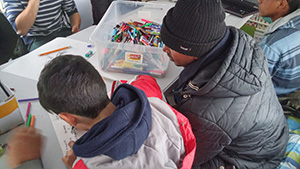 There are a number of ways that people can support the work that we do. We are keen to engage new volunteers with the requisite experience, and provide training both online and in situ. We have an ever-growing network of schools (School Friends programme) and universities (UNIfied programme) that we link with and welcome additions to this.
There are a number of ways that people can support the work that we do. We are keen to engage new volunteers with the requisite experience, and provide training both online and in situ. We have an ever-growing network of schools (School Friends programme) and universities (UNIfied programme) that we link with and welcome additions to this.
During Refugee Week, we encourage people to take the time to consider the ways in which their own educational experiences have shaped and benefitted them. There is currently an entire generation of young people who are being denied these opportunities. Any way in which you can support projects such as ours and the many other incredible ones operating, both in the UK and overseas, will be helping to redress that balance and provide young displaced people with the educational opportunities they deserve.
Find out more about the School Bus Project and how to get involved by visiting www.schoolbusproject.org or follow us on Twitter.
Refugee Week takes place every year across the world in the week around World Refugee Day. The week includes a programme of arts, cultural and educational events and activities that celebrates the contribution of refugees to society and promotes a better understanding of why people seek sanctuary.
Cambridge Assessment has been involved in a number of initiatives to help refugees and forced migrants access education. If you can see an opportunity for us to work together to support refugees and forced migrants with their learning, then please get in touch.